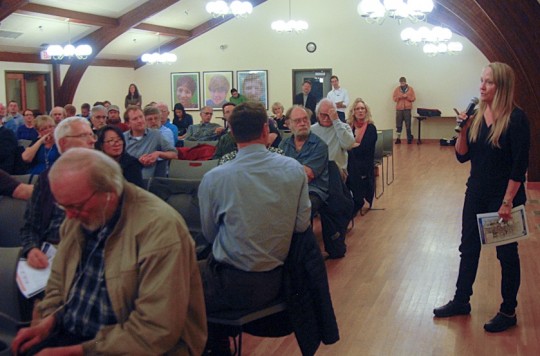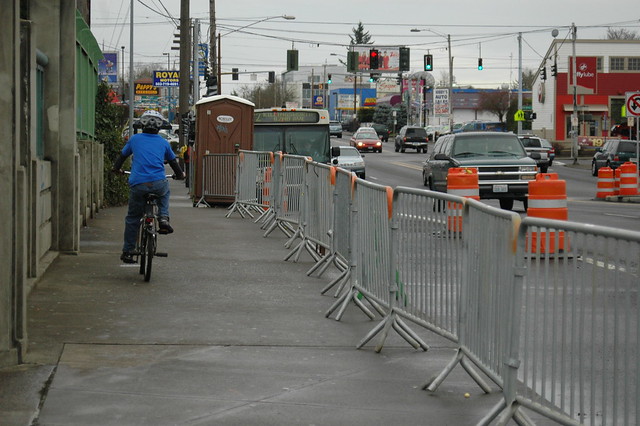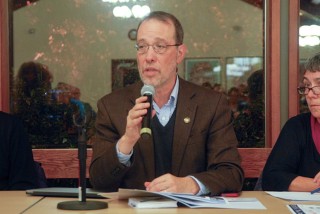It’s looking as if the 2015 legislative session could bring a change that Portland transportation advocates have dreamed of, without much hope, for years.
“At this point, jurisdictional transfer is on the table.”
— Michael Dembrow, Oregon State Senator (D-Portland)
Several months ago, Portland Mayor Charlie Hales memorably described the fight over whether the state or city should own Portland’s urban highways as two people at a restaurant who keep pushing the check to each other. At a town hall Thursday at Portland Community College on 82nd Avenue, a team of state legislators essentially kicked off a campaign to start paying the bill.
That’d mean finding state money to improve enough of 82nd Avenue’s sidewalks, pavement and crosswalks that the City of Portland would be willing to take responsibility for the much-used but deadly five-lane road that once marked its eastern border.
“There are needs for urban highway transfers from one side of the state to another,” state Sen. Michael Dembrow told the crowd Thursday. “At this point, jurisdictional transfer is on the table.”
Gerik Kransky, advocacy director for the Bicycle Transportation Alliance, said in an interview Friday that moving 82nd Avenue from the Oregon Department of Transportation to the Portland Bureau of Transportation would be a major boon in improving the bikeway crossings at Mill and Burnside, among other spots.
“Those are things that PBOT knows how to do and it’s not as much of a priority for ODOT,” Kransky said. “The City of Portland is a little bit more experienced when it comes to the needs of a neighborhood and of a community than the state department of transportation.”
Dembrow said the money to make jurisdictional transfers possible would need to come from “a package of transportation initiatives coming out of the legislature,” possibly in 2015.
“A number of legislators and other people have been meeting for quite a while toward that end,” Dembrow said.
Last December, we shared news that Mayor Hales was backing this plan.
The most likely scenario, according to Metro lobbyist Randy Tucker, is a statewide one-cent gas tax increase that would raise $26 million a year and be dedicated entirely to bringing state roads up to local standards so they could be moved under local control.
Tucker said the Oregon Transportation Forum, a broad-based coalition of transportation interests that includes the BTA, TriMet, AAA Oregon and the Oregon Trucking Association, had unanimously agreed Thursday to endorse such a tax hike in combination with various other transportation initiatives.

Meanwhile, many citizens participating in Thursday’s town hall testified to the many problems with 82nd Avenue.
“It has areas where buildings come to within about two feet of the curb,” said John Mulvey of the community group Foster United. “It has areas where it’s impossible to get even as a fully healthy adult, let alone someone who needs a wheelchair.”
Lew Scholl, land use and transportation chair of the Montavilla Neighborhood Association, said that only large-scale redevelopment would bring in enough money to fully improve the street, and that as that happens the state should reduce the number of driveways fronting on the highway.
“They’d be real sidewalks instead of just driveway sidewalks,” Scholl said. “There wouldn’t be the need for the continual left-turn lane all the way down.”
Advertisement
Carol Otis, the owner of Cartlandia, pleaded local policymakers to help solve what she called a “pothole” at her popular food cart pod’s driveway: a break between street and parking lot that she said bureaucratic issues seemed to be preventing anyone from fixing.
Metro Councilor Bob Stacey, who represents the area, noted that investments in 82nd would complement the investments that are now being planned on Division. The regional planning agency is in talks about a plan that might add a bus rapid transit line along Division and Powell, with half the construction costs coming from the federal government.
“It’s going to cross 82nd,” Stacey said. “We think the right place to cross it is here.”
Sitting at the front of the room with his House colleagues Alissa Keny-Guyer and Barbara Smith Warner on either side, Dembrow said jurisdictional transfer of 82nd to the city might help all of these issues.
“The sense I’m getting from the community is this is something we should be pursuing,” he said, noting that the 2015 legislative session will have many competing priorities. “It’s going to require everyone who has an interest in that to get involved.”
Dembrow urged people at Thursday’s meeting to write their legislators — including Dembrow himself — in support of funding jurisdictional transfers.
“Hearing from you about this issue as something that we should be pursing really strengthens our hand,” Dembrow said.
Not every voice on Thursday supported the proposal to transfer ownership of 82nd, however.
“If you give it over to the city, they’re not going to have the money to do what they want to do,” said Terry Parker of the Rose City Park Neighborhood Association. “They already don’t have enough money. I was at the meeting last night on the street fee, and they’re short.”
In a conversation with Tucker after the meeting, Parker added another concern.
“If Portland gets ahold of the street, they’re going to make a mess of it for drivers,” Parker said.




